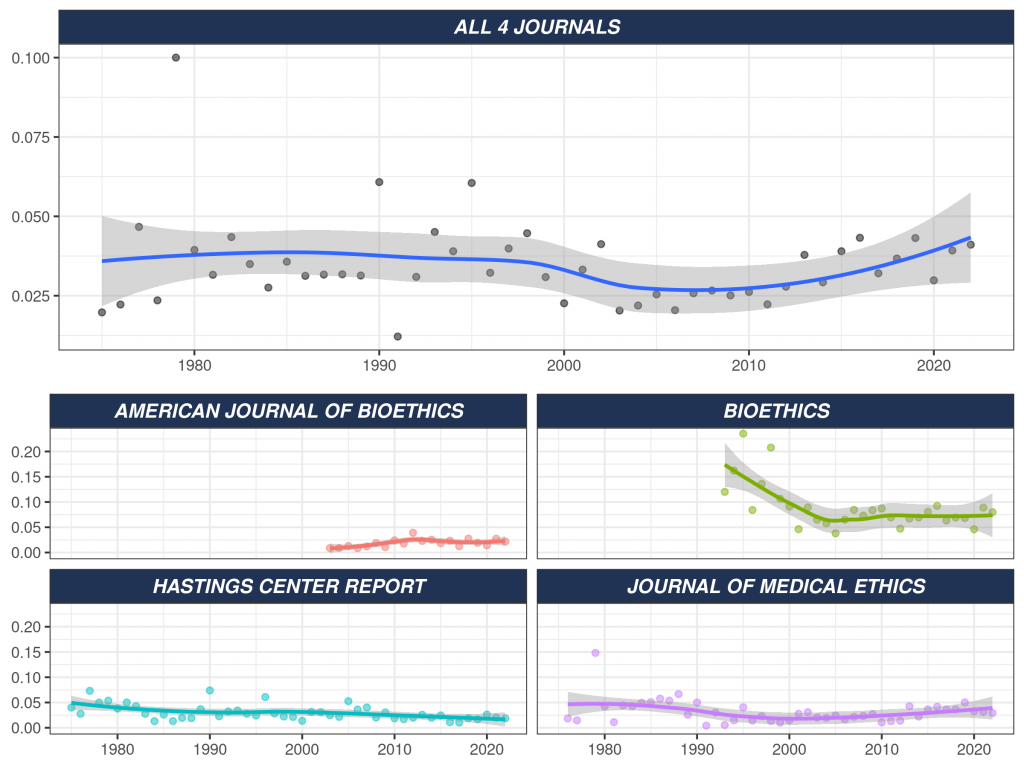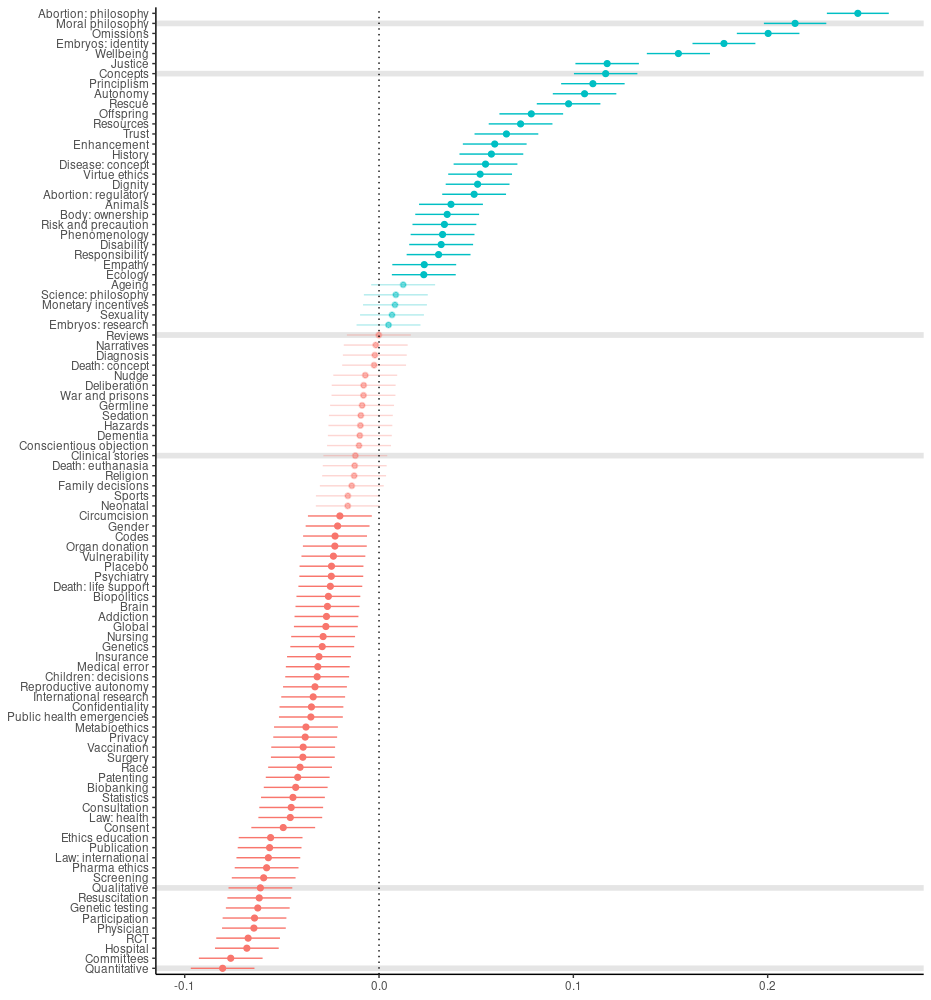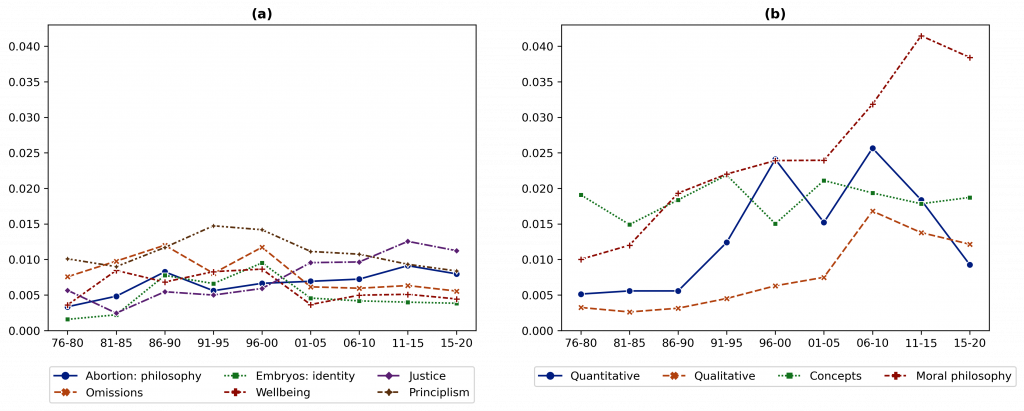Are Philosophy’s Glory Days in Bioethics Over? (guest post)
How has philosophy’s role in cognate disciplines been changing? We could ask this question about philosophy and political theory, or cognitive science, or business ethics, or theoretical physics, and so on. In the following guest post, the focus is on philosophy and bioethics.
Authors Vilius Dranseika, Piotr Bystranowski, and Tomasz Żuradzki (Interdisciplinary Centre for Ethics, Jagiellonian University) examine the claim that philosophy’s role in bioethics is diminishing. They take a data-driven approach to the problem, looking at trends in how frequently philosophical work is cited, and how often especially philosophical topics are discussed, in bioethics literature. In addition to putting forward their view of the matter, they are seeking feedback from readers about this method and their particular application of it.

Are Philosophy’s Glory Days in Bioethics Over?
by Vilius Dranseika, Piotr Bystranowski, and Tomasz Żuradzki
There is a familiar claim that, when compared to the early days of bioethics, the role of philosophy in bioethics has diminished. Let’s call it the Disconnection Thesis. The latest discussion of this claim can be found in a recent American Journal of Bioethics (AJOB) target article, “The Place of Philosophy in Bioethics Today” (Blumenthal-Barby et al. 2022). While the authors do not openly endorse the claim, much of the paper consists of suggestions how the role of philosophy in bioethics could be made more pronounced. However, do we know whether the Disconnection Thesis is true? How could we test it? And even if we concede that philosophy plays a relatively small role in bioethics today, can we check whether that role was significantly more marked at some earlier stage of this relatively young academic field?
In this blog post, based on our commentary just published in AJOB (Bystranowski, Dranseika, Żuradzki 2022b) we would like to do two things. First, we describe several attempts to test the claim that the role of philosophy in bioethics has diminished. Second, we want to encourage the readers to suggest what other observable—and testable—patterns we could expect were this claim true.
First, we hypothesized that, if the Disconnection Thesis is true, older bioethics articles can be expected to relatively more frequently cite philosophy articles. To test this, we downloaded Web of Science citation data for papers published in the four key bioethics journals: American Journal of Bioethics, Bioethics, Hastings Centre Reports, and Journal of Medical Ethics. For all references in the four journals in a given year, we calculated the proportion that cited articles published in philosophy journals. To identify philosophy journals, we used the National Science Foundation (NSF) journals classification. NSF classifies 21,304 journals in total, of which approximately 1% is classified as Philosophy. This, however, required a few manual corrections: we added Ethics, Philosophy & Public Affairs, and Social Philosophy & Policy to Philosophy, and excluded Kennedy Institute of Ethics Journal and Christian Bioethics. As can be seen in Figure 1, the proportion of citations to philosophy journals is relatively stable over time—while the Disconnection Thesis would predict a decline. One can also ask whether this proportion (hovering around 4% of all citations to journals classified by NSF) is lower than could have been expected. It is difficult to say. On the one hand, philosophy journals constitute only approx. 1% of journals classified by NSF, thus 4% of citations may after all be quite remarkable. On the other hand, it is not obvious what prior expectations one should have in this situation. We leave it to the reader to decide whether this level of engagement with philosophy is best interpreted as ‘consistently low’ or ‘consistently high’. The important point is that neither of these interpretations favours the Disconnection Thesis.

Figure 1. The proportion of number of references to Philosophy journals to the number of all references to journals in a given year for four key journals in bioethics (American Journal of Bioethics, Bioethics, Hastings Centre Reports, Journal of Medical Ethics, established, respectively, in 1999, 1987, 1971, and 1975) in combination (top) and individually (bottom). Lines represent locally estimated scatterplot smoothing with 95% confidence intervals. Based on Web of Science citation data and (manually corrected) NSF journal classification.
It is worth mentioning that NSF classifies most of philosophy of science journals not in Philosophy but in Science Studies. Manually reassigning the main philosophy of science journals to Philosophy does not alter the picture significantly.
Second, we decided to check whether bioethical issues that are most tightly linked to philosophy become less pronounced over time in bioethics literature. To select bioethical issues that are ‘paradigmatically philosophical’ we drew on our earlier topic modeling study (based on a a corpus of 19,488 texts published since 1971 in seven leading journals in the field of bioethics and philosophy of medicine; Bystranowski, Dranseika and Żuradzki 2022a). For each of the 91 content-based topics from our model (as well as 6 framing topics, see below), we calculated Pearson’s coefficients for correlation between the prominence of a given topic in a document and the proportion of citations from that document to Philosophy journals. These results are provided in Figure 2.

Figure 2. Pearson’s coefficients for correlations between the prominence of a given topic in a document and the proportion of citations from that document to Philosophy journals. Highlighted rows correspond to the 6 “framing topics.” Error bars represent 95% confidence intervals. Opaque dots correspond to coefficients that do not significantly differ from zero. For descriptions of individual topics see Bystranowski, Dranseika and Żuradzki (2022a).
Using this approach, topics most associated with philosophy are: Abortion: philosophical issues, Doctrine of double effect and act/omission distinction (or Omissions), Metaphysics of beginning of life (or Embryos: identity); Health and wellbeing, Justice and equality, Principlism debate. Looking at diachronic developments in the prominence of these six topics in the four key bioethics journals suggests that neither of these topics exhibit a downwards trend (see Figure 3a). In fact, each of them exhibit a moderately positive trend.

Figure 3. The mean prevalence of (a) the six content-based topics most strongly associated with citing Philosophy journals and (b) four framing topics, across 5-year periods (from 1976 to 2020) in four key journals in bioethics (American Journal of Bioethics, Bioethics, Hastings Centre Reports, Journal of Medical Ethics).
Finally, our topic model also allowed us to identify six topics that we interpreted as corresponding not to specific content-based themes but rather to distinct methodological perspectives and forms of discourse employed in bioethics and philosophy of medicine. As indicated in Figure 2, some of these ‘framing topics’ (Cohen, Priva and Austerweil 2015) were associated with philosophy in the sense that the more a document was associated with this topic, the higher was the proportion of philosophy citations in this document. In particular, such ‘philosophical’ topics were Moral philosophy discourse and Definitions of concepts. Other framing topics (particularly, Qualitative empirical bioethics and Quantitative empirical bioethics) were negatively associated with the proportion of philosophy citations. As can be seen in Figure 4b, neither of the two ‘philosophical’ framing topics seem to be displaying the pattern suggested by the Disconnection Thesis. Moral philosophy discourse is gaining prominence in bioethics over time while Definitions of concepts is remarkably stable over time. A somewhat more complex pattern is exhibited by the two least philosophical framing topics. Both Quantitative and Qualitative empirical bioethics are virtually absent till 1990s, then they gain in prominence, while showing signs of decline in the most recent decades (possibly due to empirical bioethics moving to newly established journals, such as AJOB: Empirical Bioethics). One could perhaps raise a possibility that the Disconnection Thesis is partly motivated by the latter two framing topics gaining visibility in bioethics journals around 2000-2010. Under this hypothesis, the increased visibility of empirical perspectives in bioethics journals perhaps contributed to the impression that bioethics is moving further away from philosophy.
Overall, in our three attempts to test the Disconnection Thesis, we failed to find evidence for it. What we see triangulating several different approaches, is a relatively stable—and sometimes even increasing—association of bioethics with philosophical scholarship, topics and modes of argumentation. Were we looking in the wrong places? We would like to use this opportunity to encourage the readers to suggest what other observable—and testable—patterns we could expect were this claim true, as well as what other data sources we could use in further study of this question.
A more extended discussion can be found in our “The Disconnection That Wasn’t: Philosophy in Modern Bioethics from a Quantitative Perspective“.
References:
Blumenthal-Barby, J., S. Aas, D. Brudney, J. Flanigan, M. Liao, A. London, W. Sumner, and J. Savulescu. 2022. The Place of Philosophy in Bioethics Today. The American Journal of Bioethics 22 (12):10–21. doi:10.1080/15265161.2021.1940355.
Bystranowski, P., V. Dranseika, and T. Żuradzki. 2022a. Half a Century of Bioethics and Philosophy of Medicine. A topic-modeling study. Bioethics 36 (9):902–925. doi:10.1111/bioe.13087.
Bystranowski, P., V. Dranseika & T. Żuradzki. 2022b. The Disconnection That Wasn’t: Philosophy in Modern Bioethics from a Quantitative Perspective. The American Journal of Bioethics 22 (12), 36-40. doi:10.1080/15265161.2022.2134490
Cohen Priva, U., and J. L. Austerweil. 2015. Analyzing the History of Cognition Using Topic Models. Cognition 135: 4–9. doi:10.1016/j.cognition.2014.11.006.



It would be interesting to see whether the proportion of articles authored by people with PhDs in philosophy has changed over time.
Thanks for the suggestion! Indeed, this would be interesting. A related hypothesis is that people educated in theology played much larger role in early bioethics than they do now.
The problem, however, is that data on PhDs are not easily available, so this would require quite a lot of little case-by-case fact-finding missions.
I don’t know if this is easy to track with the data set you have, but I’d be interested in whether or not the citations to philosophy are any more or less up to date over the years. That is, are contemporary bioethics papers citing philosophy journals at the same rate but citing _older_ things, or are they staying up to date on the literature. (I think this would be a bit tricky as it might require getting some kind of baseline about how “up-to-date” we in philosophy are.
And it’s not that I think ethics or philosophy has to totally held hostage to what’s been published in the last few years. Rather it would be a way to get a grip on whether the disconnect is sort of temporal—that they are citing things, but only or mainly the things that had already made it into their intellectual world. It’s one thing to cite JJT in every article on abortion. It’s another to keep up with recent work. Seems like a version of disconnect somehow worth probing.
Thanks! This is an excellent suggestion, and the data we already have can be used for it. [In fact, we’ve been looking recently into structurally similar issues in bioethics/biomedicine engagement.]
The problem of baseline is interesting as well. It is easy to check average or median “age” of citations for a given year, or check proportion of citations in a given year that are new (say, to papers published in the past three years, so that publication delay can be acommodated), or some other measure of this sort, and then check if there are any diachronic trends. This would allow for a number of interesting analyzes with minimal committments to some interpretable baseline.
This is really neat work; thanks for sharing! My impression is less that philosophy’s relevance is falling in bioethics, but rather that *empirical* bioethics has substantially replaced *conceptual* bioethics. And, as it turns out, philosophers are more likely to be doing conceptual work than empirical work, so philosophers’ loss of market share might have less to do with them being philosophers than what *sort* of work they’re doing.
But like, think of some of the most famous bioethics arguments from philosophers; maybe just take abortion (Warren/Thomson/Marquis) and end-of-life (Rachels/Brock/Callahan) as archetypes. I do think it’s fair to say that those sorts of explorations have more-or-less run their course, and what’s striking about all of them is how conceptual (i.e., non-empirical) they are. It’s not like we’re going to get a robustly new account of something like informed consent at this stage, either, for example.
And now journals like AJOB Empirical Bioethics are (apparently) doing great; whereas (regular) AJOB feels less vibrant. But that’s just impressionistic, so I get it. Rather, I just wanted to make the point that I think the *empirical stuff* is increasingly where the action is, which might marginalize (non-empirical) philosophers.
Also, as a hypothesis, this re-positioning favors bioethicists working in medical schools (or social sciences), which wouldn’t be surprising: those are large and strong groups, and they’d want to move the discipline beyond philosophy. Which, apparently, they have. (Or, again, at least into empirical investigations.)
Again, thank you for sharing this exciting work!
Thanks a lot!
The empirical turn indeed seems to be a thing, esp. compared to the 1970s/1980s. In our dataset (i.e., four key journals), the empirical turn seems to be subsiding for the past decade or so, but this perhaps only means that much of empirical work in bioethics moved to newer journals that are sometimes explicitly focused on empirical work (AJOB Empirical Bioethics is a good example).
I believe you should also have looked at the CV of the articles authors to see how many of them have training in Philosophy and have published on other philosophical topics besides Ethics.
In my experience, many of the people publishing on “Bioethics” do not have a background in Philosophy, so it is unrealistic to expect that they will quote any Philosophers. Example: I have never seen an author who quoted Eric Voegelin even though his 5-volume “Order and History” is very relevant to the way we do “Bioethics.”
Thanks a lot for this comment! Indeed, looking into composition of the authors in terms of their background would be interesting. Also, it would be possible to check if indeed authors with backround in philosophy cite philosophy papers relatively more frequently.
Our main focus, however, is not to evaluate whether there is a strong/weak (in absolute terms) connection between bioethics and philosophy, but rather to evaluate whether this link is getting weaker/stronger over time.
What worries me is the quality of Philosophy Education. For 4 years, or so, I worked closely in a project, with PhD in Philosophy from a good university, who candidly told me he had never ready any philosophy that was published before 1950. The horizon of Philosophy is at least about 2800 years away, and the horizon of my friend reaches only the last 72 years. I must add that I consider the work of your team very important, necessary and revealing.
I’m doing a survey for professional bioethicists on their ethical views (data is collected but the paper is not yet ready). We contacted the editors and editorial board members of 19 journals in bioethics and closely related fields. We also contacted corresponding authors of research articles published in 2021 in 9 top journals in the field. We contacted 1000 scholars and 200 of them responded to our survey.
46 % of those who responded had a PhD in Philosophy, and 46 % had a PhD in another field. The rest did not have a PhD at the time.
The difference between Quantitative and Qualitative is fundamental for these problems of methodology and complexity of his phenomenology.
Sorry to be a wet blanket but I am not clear how this quantitative breakdown bears on the claims in the original article.
Here is the abstract of the article that the breakdown is supposed to rebut: “While philosophers were especially important in the early days of the field, so the argument goes, the majority of the work in bioethics today involves the “simple” application of existing philosophical principles or concepts, as well as empirical work in bioethics. Here, we address this view head on and ask: What is the role of philosophy in bioethics today? This paper has three specific aims: (1) to respond to skeptics and make the case that philosophy and philosophers still have a very important and meaningful role to play in contemporary bioethics, (2) to discuss some of the current challenges to the meaningful integration of philosophy and bioethics, and (3) to make suggestions for what needs to happen in order for the two fields to stay richly connected. We outline how bioethics center directors, funders, and philosopher bioethicists can help.”
I wonder:
(i) How does this article support responses to 1, 2 and 3?
(ii) Does it somehow support the view that these are not pressing issues?
I am inclined to think no, this is just not addressing the issues that were raised, but I am open to persuasion
Thanks for this comment. We did not see our contribution as an attempt to rebut the paper by Blumenthal-Barby and her colleagues, and our commentary does not discuss the three main aims of the paper. We instead see it as an investigation inspired by its background assumption that “philosophers were especially important in the early days of the field”, but “philosophy’s glory days in bioethics are over” (i.e., the Disconnection Thesis). In particular, we were interested in this question: “if the role of philosophy in bioethics has been indeed diminishing, what kind of observable patterns should we expect to see?”.
One can interpret the claim about the diminishing role of philosophy only, or mostly, in qualitative terms (that is, the quality of philosophical engagement in bioethics is deteriorating ). Still, this qualitative change should be traceable, for example, in citation patterns. One could expect that if philosophers were indeed especially important in the early days of the field papers published in bioethics journals should cite philosophy journals more frequently than now, but we have not observed anything like that.
So, our intention was not to claim that these three points are not pressing issues.